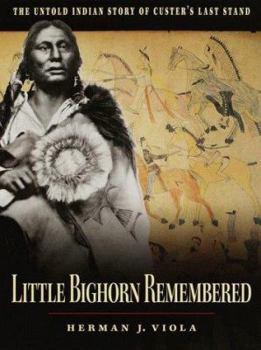Little Bighorn Remembered: The Untold Indian Story of Custer's Last Stand
Select Format
Select Condition 
Book Overview
On the morning of June 25, 1876,??soldiers of the elite U.S. Seventh Cavalry led by Lieutenant Colonel George Armstrong Custer attacked a large Indian encampment on the banks of the Little Bighorn... This description may be from another edition of this product.
Format:Hardcover
Language:English
ISBN:0812932560
ISBN13:9780812932560
Release Date:October 1999
Publisher:Crown Publishing Group (NY)
Length:256 Pages
Weight:3.18 lbs.
Dimensions:0.9" x 9.4" x 12.2"
Customer Reviews
4 ratings
The best book I've ever read!!
Published by Thriftbooks.com User , 20 years ago
This book is so ground-breaking and thorough and clever that I'll read it again as soon as I get time. The narratives and recollections of native Americans combined with the most up-to-date scholarship make this book a small masterpiece. Our view of the battle was so slanted and biased, generally without intention, because of an overemphasis on the records of European participants, etc. This book gives another view, and thus B-A-L-A-N-C-E.!!
A major work.
Published by Thriftbooks.com User , 23 years ago
In general I'm not really big on modern history (my notion of "modern" being everything after 1200 BC!), but Viola's book "Little Bighorn Remembered," featured as it was as the "untold Indian story of Custer's last stand," intrigued me. I have to admit to having had to take a second run at it before I really got into the subject. It isn't that the work is poorly written; it isn't. I think that the up front and in your face brutality of the 19th Century US government in dealing with the Native American population was just hard to deal with for me. It`s not that I am myself Native American; I just have a strong sense of fairness and fairness had no part in it. When I finally did settle into the material, however, it read rapidly. In fact it probably classifies highly with some of those I-couldn't-put-it-down novels over which people burn the midnight oil. (In my case I should have been getting a quick nap between patients while I was on-call for the OR on a night shift). The first two chapters of the book concern the antecedents leading up to the Indian confrontation with Custer and the 7th Cavalry. These included Custer's own pre-dawn attack on a sleeping Cheyenne village under the leadership of Chief Black Kettle on the Washita River in 1868 and an earlier similar attack on Plains Tribes camping at Sand Creek in 1864. In both instances dozens of men, women, and children were hunted down and shot and their bodies butchered. In the 1868 attack even the Cheyenne pony herd, some 900 animals, was also killed, severely crippling the people's ability to pursue their traditional lifestyle. The narrative of these two chapters is filled with unfulfilled promises and broken treaties with Native Americans in the furtherance of US territorial expansion during the 19th Century. Certainly anyone familiar with the attitudes of Europeans toward technologically less advanced populations world wide in areas they wished to exploit will recognize the pattern.The remainder of the book is divided into chapters each dealing with various perspectives on the battle of the Little Bighorn. Here is where the book rises above others on the subject, for Viola makes use of very diverse sources in his effort to thoroughly and fairly cover the subject . Included are the oral histories passed on by the Indian participants, stories from the Cheyenne and the Dakota on one side and from the Crow and Arikara scouts with Custer on the other. Probably the most interesting part of this material is the fact that not all Plains Indians felt the same about the coming of the army into the area. In fact the imperialism of the US government was actually superimposed upon on-going events among traditional enemies within the community of local people. The long standing enmity of certain groups actually facilitated the ultimate defeat of the Plains Indians. Even allies weren't necessarily of one mind and still are not. A popular saying among the modern Cheyenne is that "The
Crow accounts are valuable
Published by Thriftbooks.com User , 24 years ago
I found this book to be fascinating pictorially and in its presentation of Indian viewpoints of Little Bighorn.Some other reviewers have criticized Herman Viola's inclusion of the accounts of Custer's Crow scouts, as if Viola is somehow doing a disservice to scholarship. However, I don't think he is necessarily presenting these accounts as gospel. Viola acknowledges the inconsistencies between witnesses' stories, but he gives the Crow a chance to speak for themselves, which seems like a good thing to me.Perhaps by publishing these little-known testimonies, Viola will encourage other Indian sources to share their knowledge of Little Bighorn while that knowledge still exists.
An insight into the genocide that REALLY won the West
Published by Thriftbooks.com User , 25 years ago
It has become common, of late, for political commentators and historians to debunk those myths about our history as a nation which had always been accepted as fact. Mr. Viola not only accomplishes that for the Custer legend, but he gives us a whole new way of understanding the struggle of the plains indian tribes to preserve their way of life against the flood of white settlement which would inevitably overwhelm it.How inspiring to learn how the traditions of the warrior societies have been revived to embrace the realitles of modern military service. How sad to hear that many native americans still fear the retaliation of the U.S. government for a defeat which it suffered at their forefathers' hands some 123 years ago.





